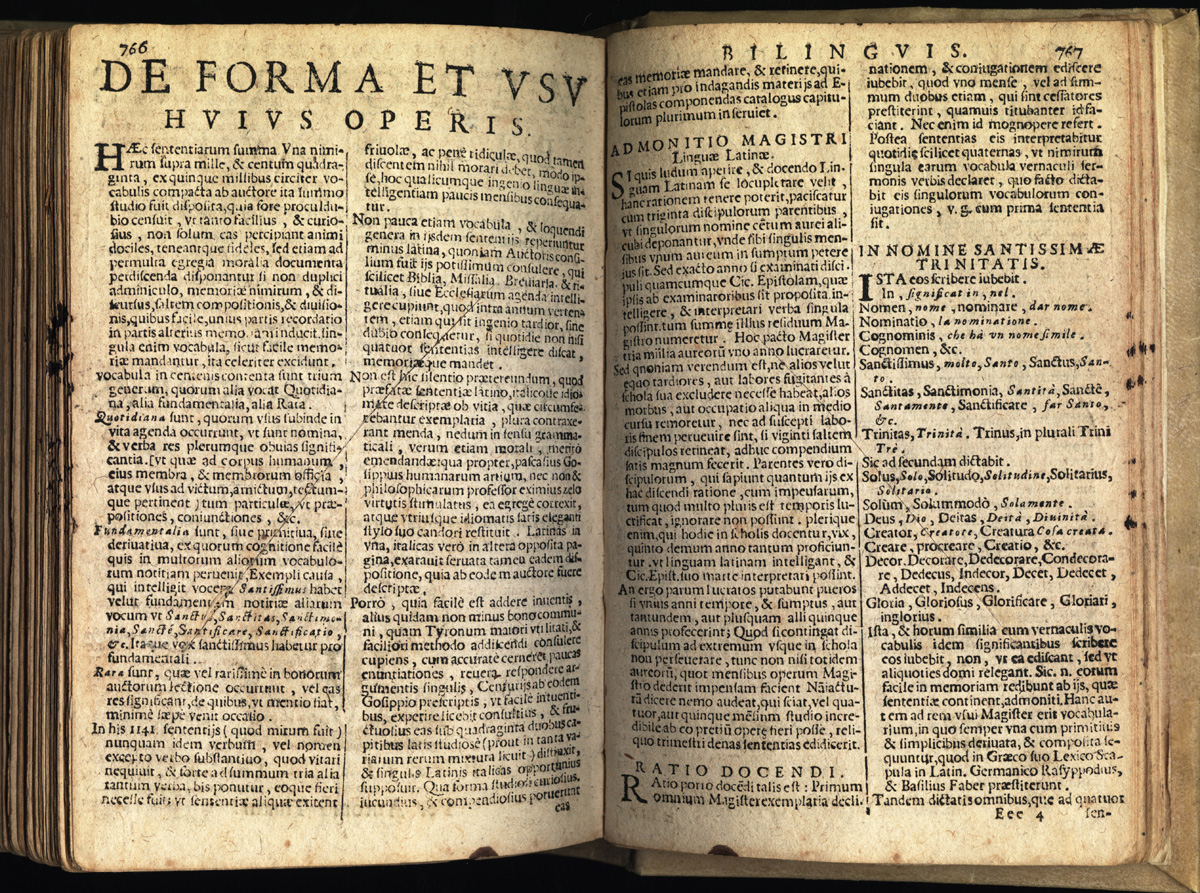2.20 How and Why to Drill

Teachers were instructed in the preface to drill their students in the noun and verb paradigms (essentially the procedure of the old Donat) before beginning with the Mercurius. Then they were to parse and drill four sayings from the Mercurius each day in detail for two months. Thereafter they could increase the daily dose to ten sayings so that within a year all 1,141 sayings would have been drilled. In the sample drills, Latin is clearly the target language, but the title page implies that a Latin speaker (perhaps Schoppe envisions a German like himself) could master spoken Italian in the same way. That this was Schoppe's sense of his work is confirmed by the publication within a decade of a Mercurius quadrilinguis which offered the same sayings and proverbs in four-column format, adding Greek and Hebrew equivalents to the Italian ones in the bilingual original. Still, it is hard to say how seriously Schoppe intended his "Mercuries" to be used for teaching Italian to foreigners. They appeared mostly on the Italian market and the only modern language to appear was Italian, so the shortcut to languages they offered was almost surely intended for native speakers of Italian studying classical languages.
Schoppe's parsing examples are instructive of the degree to which even so thoroughly bilingual a system as the one he advocates was based on traditional drills. In the main text of the book each phrase was given a precise Italian equivalent. So, for the very first phrase, In nomine Sanctissimae Trinitatis, the printed text gives in, o nel nome della Santiss. Trinita. The instructions in the front matter told the Latin master to make each student write out the Latin phrase. Then the class together was to drill each word with its Italian equivalent. Related or derivative words were added with their Italian equivalents. So, for nomine, the students were told to recite the nominative Latin, nomen and the Italian nome, and also to recognize the derivative Latin verb and its Italian twin, "nominare, dar nome." Both the noun and verb were to be parsed fully in Latin with vernacular equivalents ("nomen, a name; nominis, of a name; nomine, by or for a name...") before the class went on to the next word.
Schoppe was explicit on the pedagogical psychology of combining such oral drills with writing and on the responsibility of the master to proceed at a rate that the students can follow. The master, moreover, was to furnish his classroom with appropriate tools:
[The teacher] will require his students to write out each of these words and those which have similar meanings in the vernacular, not so they will learn them immediately, but so that they will re-read them several times at home. For it is not easy for them to recall to memory the things that are contained in the sayings if they are merely admonished orally. On this account the master will employ a dictionary in which derivatives are always given together with the roots and compounds, the best being the Greek-Latin Lexicon of Scapula, and for German-Latin Rasyppodius and Basilis Faber. (116)
This advice assumed, perhaps unrealistically, that the Italian schoolmaster would have access to the best recent reference books published abroad, for example, Johannes Scapula's Lexicon Graeco-Latinum recentiss. (published at Geneva in 1593; Basel in 1605, etc.). In fact these books might have been available in Milan, Padua, or Venice in the period, but it is unclear that they could easily be found in more provincial towns; and it is unclear why Italian students would want or need one of the Greek-German dictionaries that Schoppe also recommended. Certainly many a schoolroom did without.
Schoppe framed his collection of proverbs as the start of a comprehensive beginning language course. He continued a long tradition of seeing moral sayings as well as practical ones as the right vehicle for language acquisition. However, he untied the reading of proverbs from the parallel memorization of grammatical rules that had obtained in medieval and Renaissance Latin classrooms. Schoppe developed a comprehensive, all-purpose phrase book for learning the spoken and written language; it is preceded only by drilling in the noun and verb paradigms. That is, the matter of Cato has been detached entirely from the schoolbook it accompanied for so long, the Donat, and subsumed into a new form entirely, the textbook targeted specifically at the speakers of one (usually modern) language who wish to learn another, ancient or modern one. Schoppe was nothing if not prolific and ambitious. He authored a number of other schoolbooks, including a Latin grammar intended to accompany the Mercurius bilinguis and introductory works on rhetoric. He also wrote several works on curriculum which combined remarks on educational psychology, details on the structure of a humanities course, bibliographical essays and recommended-reading lists, and pointed criticism of contemporary schools, especially the Jesuit colleges. (117)
NOTES
- Open Bibliography
- (116) Schoppe 1699, 767: Ista, & horum similia eum vernaculis vocalibus idem significantibus scribere eos iubebit, non, ut ea ediscant, sed ut aliquoties domi relegant. Sic. n. eorum facile in memoriam redibunt ab ijs, quae sententiae continent, admoniti. Hanc autem ad rem usui Magister erit vocabularium, in quo semper una cum primitivis et simplicibus derivata, & composita sequuntur, quod in Graeco suo Lexico Scapula in Latino, Germanico Rasyppodius & Basilius Faber praestiterunt.
- (117) Schoppe 1628b, 1629, 1671. Further on Schoppe, Hausmann 1995; Grafton 1998.